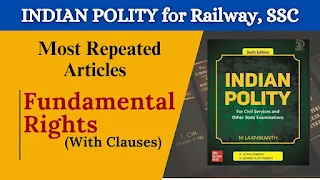Important Articles of Indian Constitution
1. Article 14: Equality before Law &
Equal Protection of Laws.
It is the 1st
fundamental right which speaks about Equality.
It is applicable for
all citizens including foreigners but not for enemy aliens.
Equality before Law
means everyone will be treated as equal in the matter of Justice.
Equal protection of
Laws means for different persons different laws will be applicable. Just like
we don’t serve the same meal to 5y & 10y old child.
1. Art. 15: Prohibition of Discrimination
on the Grounds of Religion, Race, Caste, Sex or Birth.
The most important part
of this article is in the Clause 3 to 5.
Clause 3 says that the State
can make special provisions for the Women & Children.
Clause 4: It was added
by the 1st CAA, 1951. It says that the state can make special
provisions for the Socially & Educationally Backward Classes or for the Citizens
belong to Schedule Caste & Schedule Tribes. As the definition of backword
class is not mentioned in the Constitution of India, it is State’s
responsibility to differentiate the backward classes.
Clause 5: It was added
by 93rd CAA, 2005. It says that the State can make special
provisions such as reservation, regarding admission to the educational
Institutions whether it aided by the State or not, excluding minority
educational institutions
1. Art. 17: Abolition of
Untouchability
Right to equality has
been discussed in Part-III and from Art 14 to Art 18.
Before independence,
people like Jyotiba Phule, Dr. B R Ambedkar, Gandhiji etc. protested against
this untouchability.
The word
‘Untouchability’ is nowhere mentioned in the Indian Constitution except this
article & its meaning is not only grammatically but also historically. So,
its meaning is vast.
Article 17 tells us
that practice of untouchability is forbidden. & also if someone practices
this type of behavior, that person will be punished. And to punish those
people parliament introduces ‘Untouchability Offences Act, 1955’.
‘Untouchability
Offences act, 1955’ modified & renamed in 1976 as ‘Protection of civil
rights act, 1955’
Untouchability is not new in India. Even now,
in some places in India, we can found this type of practice.
1. Art. 19: Protection of certain
rights regarding freedom of speech etc.
All citizens shall have
the right-
a.
To freedom of speech & expression
b. To
assemble peaceably & without arms.
c.
To form associations or unions or
co-operative societies.
d. To
reside & settle in any part of the territory of India
e. To Practise any profession, or to carry on any occupation, trade or business.
2. Art. 32: Constitutional Remedies
It is for the protection
of Fundamental Rights & it also a Fundamental Right itself. It is called
the ‘Heart & Soul of the Constitution’.
It says if someone’s
Fundamental right got violated, he/she can go to the Supreme Court directly by
using the article 32.
Supreme Court can issue
5 writs to protect the fundamental rights. That’s why Supreme Court is called
‘The Protector & Guarantor of Fundamental Rights’.
There are 5 writs i.e.
1. Habeas Corpus, 2. Mandamus, 3. Prohibition, 4. Certiorari, & 5. Quo
Warranto






0 Comments